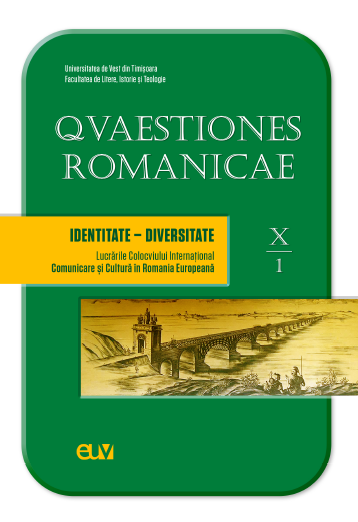Les relations internationales entre août et septembre 1939, reflétées dans les pages du journal banatien L'Ouest
Abstract: (International relations between August and September 1939, reflected in the pages of the Banat newspaper <The West>) The year 1939 began with shocking news for all those who believed in the values of democracy and in maintaining the territorial status quo established at the end of World War I: on January 2, the American magazine Time named Adolf Hitler as "Man of the Year". It should not be forgotten that 1938 marked the "triumph" of Franco-British conciliation, which hadreacted "pale" to the March Anschluss and preferred to resolve the Sudeten crisis by ceding this overwhelmingly inhabited area by the Germans. Located in southern Czechoslovakia, to the Third Reich, following a conference in Munich with Germany and Italy, along with France and England, in September. Poland and Hungary also contributed to the dissolution of the Czechoslovak state, taking over, under pressure (Hungary), with obvious Italian-German support, and the ultimatum (Poland), important regions of the Czechoslovak Republic: Tešin and Friestadt – to Poland and, respectively, Ruthenia (Ukraine) Subcarpathian – to Hungary. The signing of the Ribbentrop-Molotov Pact on August 23, 1939, was a prelude to World War II. «The West» newspaper presented, commented on and disseminated information on the evolution of international relations after the disappearance of the Czechoslovak state from the map of Europe, from credible sources, the analyzes of its reputable editors proving extremely relevant and objective. Not even the change of the profile of the mentioned newspaper determined the renunciation of the excellent foreign policy column, emblematic for this publication. The main events were Bulgarian revisionism, the Danzig crisis, the military maneuvers carried out by Germany and Italy, Hungarian revenge, the debates in the British Parliament on the imminence of a devastating new war, the internal reconciliation in Yugoslavia amid deteriorating international political climate, the ministerial dialogue between the prime minister the French (Daladier) and the German Chancellor (Hitler), the astonishment of the Japanese ruling circles towards the signing of the Ribbentrop-Molotov Pact (August 23, 1939), which marked the division of spheres of influence in Europe between the Third Reich and the Soviet Union and was preparing for the outbreak of the Second World War.
Keywords: "Polish corridor", World War II, Sever Bocu, "The West", Timișoara.
Résumé: L'année 1939 débute par une nouvelle bouleversante pour tous ceux qui croient aux valeurs de la démocratie et au maintien du statu-quo territorial instauré à la fin de la Première Guerre mondiale: le 2 janvier, le magazine américain «Time» nomme Adolf Hitler ,,Homme de l'année”. Il ne faut pas oublier que 1938 marque le ,,triomphe” de la conciliation franco-britannique, qui avait réagi ,,pâle” à l'Anschluss de mars et préféré résoudre la crise des Sudètes en cédant cette zone majoritairement habitée par les Allemands. Situé dans le sud de la Tchécoslovaquie, au Troisième Reich, suite à une conférence à Munich avec l'Allemagne et l'Italie, ainsi que la France et l'Angleterre, en septembre. La Pologne et la Hongrie ont également contribué à la dissolution de l'État tchécoslovaque, prenant le relais, sous la pression (Hongrie), avec un soutien italo-allemand évident, et l'ultimatum (Pologne), d'importantes régions de la République tchécoslovaque: Tešin et Friestadt – au Pologne et, respectivement, Ruthénie (Ukraine) subcarpathique – à l'Hongrie. La signature du Pacte Ribbentrop-Molotov, le 23 août 1939, était un prélude à la Seconde Guerre mondiale. Le journal «L'Ouest» a présenté, commenté et diffusé des informations sur l'évolution des relations internationales après la disparition de l'État tchécoslovaque de la carte de l'Europe, à partir de sources crédibles, les analyses de ses rédacteurs réputés se révélant extrêmement pertinentes et objectives. Même le changement de profil du journal mentionné n'a pas déterminé le renoncement à l'excellente chronique de politique étrangère, emblématique de cette publication. Les principaux événements ont été le révisionnisme bulgare, la crise de Dantzig, les manœuvres militaires menées par l'Allemagne et l'Italie, la revanche hongroise, les débats au Parlement britannique sur l'imminence d'une nouvelle guerre dévastatrice, la réconciliation interne en Yougoslavie dans un climat politique international qui se détériore, le dialogue ministériel entre le premier ministre français (Daladier) et le chancelier allemand (Hitler), l'étonnement des milieux dirigeants japonais face à la signature du Pacte Ribbentrop-Molotov (23 août 1939) qui marqua le partage des sphères de influence en Europe entre le Troisième Reich et l'Union soviétique et se préparait au déclenchement de la Seconde Guerre mondiale.
Mots-clés: "Couloir polonais", Seconde Guerre mondiale, Sever Bocu, «L'Ouest», Timişoara.
